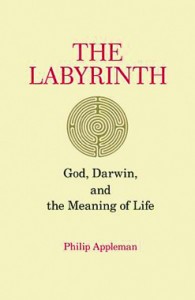The Labyrinth: God, Darwin, and the Meaning of Life

One might begin a review of Philip Appleman’s new book, The Labyrinth: God, Darwin, and the Meaning of Life, by wondering what a poet might bring to a discussion of science, religion, philosophy, and world affairs. The answer is simple: the entire kit and kaboodle, and Philip Appleman is just the man to do it. At the age of eighty-eight, he has spent a long and prolific life devoted to teaching and writing, to poetry, and to taking on the onerous and potentially unnerving task of trying to make sense of things for the rest of us, especially those of us who are nonbelievers (a small, maligned, and voiceless minority throughout much of American history). He has done so both as a man of verse and a man of science, two roles that are by no means mutually exclusive. Both the poet and the scientist must scour and dissect the world and the matters of living with both a finite vision and a broad perspective. Both must be willing to face up to the ordeal and the consequences of asking: How does this really work, and why?

Philip Appleman (Dale Robbins / Moyers & Company)
While most agnostics and atheists took their comfort in quiet corners, not daring to confront the bigotry and twisted thinking of the religions of the world with knowledge and bared reason, Appleman has often been a singular voice in poetry. His collections take dead aim at the hypocrisy and hateful behavior of the self-anointed, shining a light that demands attention and exposes the dark corridors of dogma and claimed divinity. Like many of today’s most outspoken writers on behalf of reason and humanity, Appleman has not ultimately succeeded in slaying any dragons but he certainly has made them squirm in their dens. He was doing it when other great atheist writers and thinkers like Richard Dawkins, Sam Harris, Christopher Hitchens, and Susan Jacoby were just beginning to cut their teeth, and in times when allies were damned hard to come by. He has not only offered facts and been an expert on the writings of both Darwin and Malthus, examining the implications of their work on our understanding of human existence, he has been a conscience and a touchstone for freethinkers and for artists as well. In making himself a target, he made himself an example.
To be certain, Appleman has written some of the most tender and moving poems one could dare imagine; the kind of poems that can illuminate a shadow and make you stop breathing for an instant. Like most poets, he has written of love and loss and beauty and pain, and he has done it as well as any. The following excerpt from his poem, “This Moment” (from the 1976 collection, Open Doorways), is just one example:
Treasures shine,
in your dazzling skin:
the shape of pears, gold
of nectarines, all
symmetries, and words
like melody, intelligence, waking, sleep.
To all the seductions of stone
you offer the gift of moments:
shadowy, hard,
immortal.
But in The Labyrinth Appleman is all business. As a poet writing prose, his words are concise and well chosen, his lines dense and sweeping, and he wastes not a syllable in the entirety of a precise and trim seventy-two pages. To one who is familiar with his work, it’s as though at eighty-eight he’s saying: Our time together is short; here is what I have been trying to tell you all these years in as crystalline a form as I can create: we must care for one another, for this planet we exist on only briefly, and for all the living things that share it with us. We must use our unique ability to reason as a means to make it all work, to make it all last for our common, fragile posterity. The result is a book so full of quotable lines and passages as to be dizzying and which demands to be read closely, if not wholly memorized, by anyone who thinks or plans to think seriously about the matters of existence. Not too much to cover, right? But cover it he does, all of it.
Consider the directness of this paragraph in The Labyrinth’s opening pages:
God is an unnecessary hypothesis, but for many people, suffering the terrors of the imagination, a seductive one. People in general have never exhibited much passion for the disciplined pursuit of knowledge, but they are always tempted by easy answers. God is an easy answer.
Then:
“God” is a term that deliberately masks our ignorance. Whenever God is invoked, language and sense part company. Learning is hard work; imagining is easy.
And in direct counterpoint to the spurious stance that religion is the only true arbiter of morality, Appleman writes in defense of those without religion:
Nonreligious people have no such easy out. Their moral accountability is not to some whimsical spirit in the sky, famous for easy absolutions: three Hail Marys and ten seconds of contrition. They must account to themselves and live with their own conduct; they cannot shift their short-comings onto God’s shoulders. Therefore they have to be more careful about making mistakes, and this leads naturally to an acute sensitivity to the plight of their fellow human beings. The social instincts, said the agnostic Charles Darwin, lead naturally to the golden rule.
We who call ourselves humanist or agnostic or atheist don’t have the available remedy of luxuriating in the pat explanations of ancient texts or the bumptious pronouncements of holy men. To a greater degree than those who get answers from priests, preachers, imams, or rabbis, we nonbelievers must invest more of ourselves in the great wrestling with our nature, and surely, our fate as mortal beings. How many times have all of us been asked by people of faith how it is that our lives can have meaning in the absence of a belief in a god and an afterlife? Unlike the blindly faithful, we refuse to find our meaning in the worship of death and in the chimera of an eternal life.
Appleman sums it up with grace and directness as only a poet can:
Once definitely done with our adolescent longing for the Absolute, we would find this world valuable after all, and poignantly valuable precisely because it is not eternal. Doomed to extinction, our loves, our work, our friendships, our tastes are all painfully precious. We look about us, on the streets and in the subways, and discover that we are beautiful because we are mortal, priceless because we are so rare in the universe and so fleeting. Whatever we are, whatever we make of ourselves: that is all we will ever have—and that, in its profound simplicity, is the meaning of life.
The Labyrinth is perhaps the book we have been waiting for, the one Philip Appleman has been waiting a lifetime to write. It is a comfort. Let it also be a companion.
